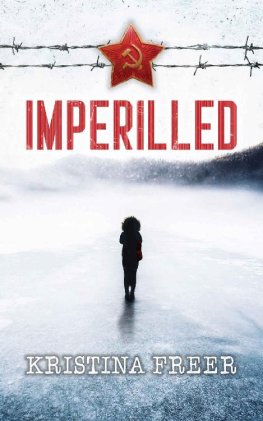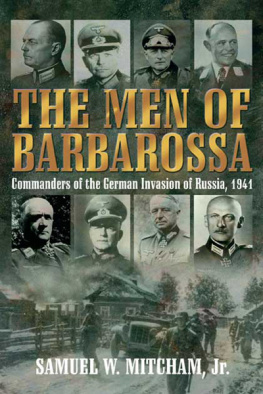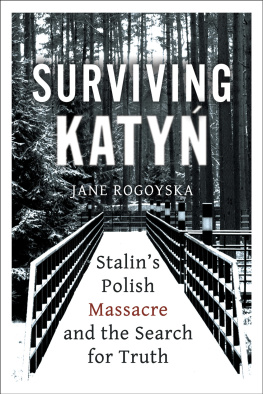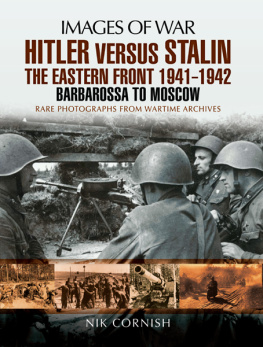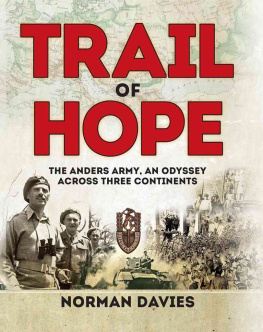For my parents, Zygmunt and Maria.
I hope this book will be a legacy to them both, and the brave Polish people who endured so much. I also hope that the world will take a lesson from the horrors of the time and that History teachers will impart the truth of the Soviet occupation of the Polish Eastern Borderlands so the like of this will never be repeated.


Until she was in her eighties, my Polish mother never spoke of her 1940s wartime experiences. Occasionally there would be a reference to some distant part of the world far removed from her origins which she never embellished and which left me perplexed.
There was never any mention of relatives, apart from an ancient Uncle in Western Poland, emigrating to America in 1911, long before she was born. When asked why I hadnt any grandparents, like all the other kids, she would simply say, They died during the war. I just assumed they buried them in eastern Poland where they lived before war broke out; like most teenagers, my past was not at the forefront of my priorities, and I never pried.
When she moved in with us, she began reminiscing about her life as a girl. Deep wonderings in uncoordinated fragments emerged, which meandered from here to there and made no sense.
When I delved further, an astounding story emerged, delivered in snippets, according to her flashes of memory. I scribbled down everything in an exercise book, intending later to do something with this jumble of reminiscences. Sometimes, she would grab the biro and draw a shaky map or correct my spelling of a place visited.
Eventually, I began compiling her thoughts into chronological order, piecing together the jigsaw that was her life story.
After five years, my first draft was complete. I asked for the opinion of a highly respected teacher who felt that it was a story that should be told in schools. She encouraged me to join a writers club to hone the final draft.
My mothers story could never be a hundred percent accurate, given her declining memory and passaging time, but extensive research has allowed me to describe the destinations she visited. With the help of authors licence I could imagine conversations between her and those she loved, bringing her story alive. Everything else is true.
Having taken so long to carry out such a mammoth task, I sat with her and read it. Tears pooled in her eyes, and she said, Ahh child, why are you bothering? It was such a long time ago; no one will read it. She died before I could publish it, and it is my silent regret she never lived to see it in print.
The Kresy may be worlds apart from the luminescent ruby stars installed atop the Moscow Kremlin, light years away from the world of power but its on its deadly radar.
It is a land of mists and swamps where elk and bison roam its vast primaeval forests. This tranquil backwater, on the eastern edge of Poland, is dotted with wooden farmsteads. Cockerels crow, farmers toil, and girls, like Marisha Glenz, spend their days in meadows herding their fathers cows.
If you think this a place where nothing ever happens think again.
10TH February 1940. Ignacy Glenzs farmhouse. Pre-dawn.
I stumbled and tripped; my nightmare getting worse. I was being dragged across the kitchen floor, cold steel against my head. I kept telling myself wake up, wake up but opening my eyes the truth dawned; this was no dream.
The Russian soldier of the Soviet Secret Police grabbed my hair and forced me against the wall. Stay quiet or I shoot.
I struggled to breathe. Everyone knew Stalins henchmen carried guns and shot anyone they wanted whenever they chose. For Christs sake, why didnt I recognise who he was in those leather jackboots and peaked cap? Tatta! Help me! I cried out, but what boomed in my head escaped as a squirming whimper.
My fathers plea ripped through the air. Tovarisch, please my daughter wasnt escaping she was shutting the door. For Gods sake, man; it was a stupid mistake. He rubbed his neck and ran his hand through his hair. Shes fifteen years old; shes just a child.
What? A mistake? My chickens eggs in the box on the shelf above the stove were hatching. Hed left the door open and the snow was blowing in; the cold would kill them. I had to shut it yet one glance at my mothers face said enough, and the way she kept wringing her hands, repeating Jess Mara, left me in no doubt my family was in trouble, I just didnt understand why. I writhed and struggled, but Peaked Cap grabbed my wrist, spun me about and pointed the barrel of his gun at my chest.
Silence!
His lips were mean, the sort that only parted in a cruel smile, and his words, in Russian, flew faster and louder. I could see no humanity in his eyes.
Things were grim enough without my mother riling him further, but whatever he said detonated her fury. He turned his pistol on her and clenched my arm so hard I squealed.
My father moved a step closer and splayed his palms. Tovarisch, please is such violence necessary? Let go of my daughters arm, I beg you. Shes done nothing wrong.
The Tovarisch ignored him, but his lethal stare was piercing.
Cowering beside him in my nightgown, my bare feet were turning numb in the melting snow hed tramped into the house. I flinched when he spoke and his saliva spattered my cheek. His breath stunk of garlic and nicotine and I turned away, trying to hold back the vomit. All the while, the Black Madonna and Child watched over us from the picture frame high on the chimney breast wall. In desperation, I sent up a silent prayer. Mother Mary, save me. Mustnt let him know Im scared.
Boots crunching on snow announced more trouble as two figures poured over our threshold. With rifles at the ready, the points of their bayonets glinted in the lamplight. They looked scruffy, muffled to the ears against the cold, with only their scarlet armbands marking them as militia.
Peaked Cap flicked his head. Search! They dispersed in the opposite direction, hunting for bedrooms at the back of the house.
My brother, Karol, staggered out first, groggy with sleep. Whats going on? He raised his hands when he felt the militiamans rifle at his back.
Gerhard, my eldest brother, and his wife, Lodzia, stumbled out next, trailed by the other militiaman with his rifle at the ready. Lodzia was gripping their little daughter on her hip, trying to pacify the crying child. What do these people want, Gerhard? Why are they here?
Silence!
Shocked, Gerhard turned, took her arm, and drew his little family closer. Ive no idea.
The militia now turned their rifles on Bookiet, my German Wolfhound snarling on his belly beside my feet, having barked himself hoarse.
My scalp prickled. Dear God, please dont let them shoot him. How will I round up the cows on my own?
Mother beckoned, her voice cracking with fear. Marishu, come to me. Its alright, child.
No, Mama, hell shoot me.
No, he wont. She met the Russians eyes and held his gaze without wavering. Enough of this madness. Please let go of my daughters arm. She meant only to shut the door.
A moment later, Peaked Cap flicked his head. Shift.
Fear, relief, and the stench of his breath proved too much; I spewed up the previous nights supper all over him, threw out my arms, and took off wailing for the safety of my mothers embrace.
Bitch! His lips pursed in an ominous line, and he looked as if he might strike me, but swiped his coat and jaw with a heavy uniform sleeve instead.

